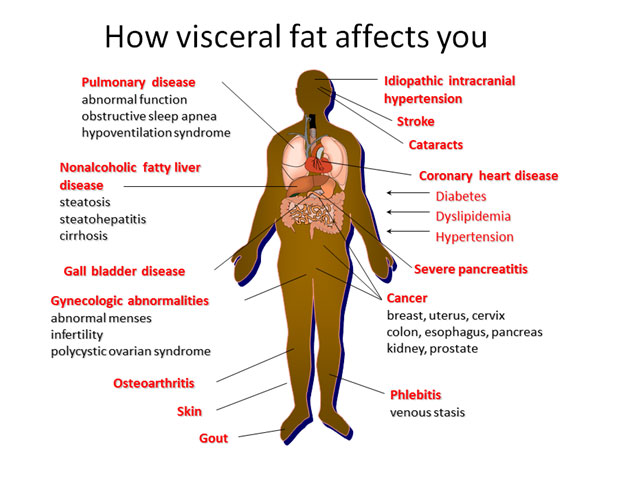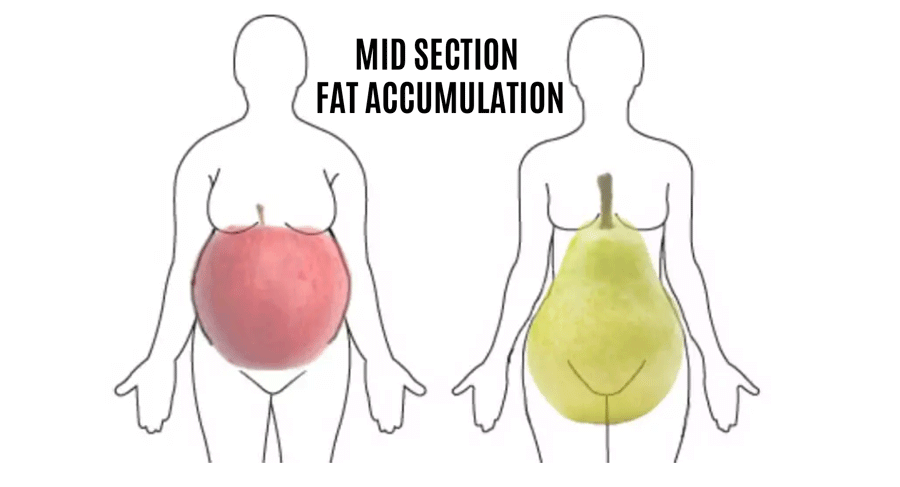Visceral Fat Loss – An Individualized Approach
Many clients come to see me about stubborn weight gain and in particular BELLY FAT . There are many online nutrition forums and resources with generic tips and conflicting advice. However, research shows the most successful long term approach is an INDIVIDUALIZED AND PERSONALIZED APPROACH. There are no quick fixes or magical pills because each human body is complex and each one of us is unique!
What is Visceral Fat and Why is it so Dangerous?
There are many factors related to belly fat – often referred to as VISCERAL FAT. Visceral fat is body fat that is stored within the abdominal cavity and is therefore stored around a number of important internal organs such as the liver, pancreas and intestines and the abdominal wall itself.
Storing higher amounts of visceral fat is associated with increased risks of a number of health problems including type 2 diabetes, heart disease, insulin resistance and even certain type of cancer . Visceral fat can also produce inflammatory markers such as IL-6, IL-1β, PAI-1 and TNF-α (.

Why are we all unique ?
- We are all at different ages, stages and genders and therefore, have varied metabolic rate and hormones (no more growth spurts – lol)
- There may be underlying health issues e.g. thyroid, diabetes, high cholesterol, arthritis, mental health concerns, cancer, auto-immune disorders, IBS and digestive disorders, etc.
- Possible food allergies and hidden food intolerances
- Possible weight gain and effects related to prescribed medications
- The presence of unhealthy commercial and fast foods versus eating whole foods
What are some of the hormonal and metabolic causes?
- Insulin resistance (caused by excessive and frequent carbohydrate intake as well as proteins which can be insulinogenic. )
- Estrogen Dominance – exposure to certain foods related to hormones produced by conventional meat, dairy, chemicals, pesticides and environmental disruptors.
- Perimenopause and post menopausal hormone changes – lowering levels of estrogen and progesterone.
- Adrenal imbalance and increased cortisol levels due to increased stress levels
Each one of these factors can be addressed with Nutrition which can play a significant role to optimize one’s health.

8 Strategies to Reduce Visceral Fat:
- Learn how to build a healthy plate for each meal to include healthy protein, fibre, low glycemic carbohydrates and healthy fats!! Healthy carbs include low sugar fruits, colourful vegetables, beans, lentils and a small amount of grains, depending on carbohydrate tolerance and metabolic flexibility.
- Reduce inflammatory foods sugar as sugar, dairy, gluten, processed foods, vegetable oils and others if you are experiencing food sensitivities and inflammation within the body. I see many individuals who think they are making healthy choices however are misinformed.
- Reduce and/or avoid snacking. Aim for 1 healthy snack (protein/carb or fat/carb) around 4 pm if needed to get you thru until dinner and avoid after dinner eating.
- Consider intermittent fasting and explore the different appropriate methods and strategies. Lots of great research leading to positive health outcomes and not only weight loss.
- Optimize digestion and gut health such as constipation, diarrhea, Irritable bowel, leaky gut and dysbiosis. The bacteria in your gut plays a large role towards a healthy weight. Eating fermented foods, improving gut flora and a probiotic can help with digestion and metabolism.
- Optimize sleep, address sleep apnea if a concern and consider a bath with some Epsom salts or lavender and some magnesium before bed if indicated .
- Practise stress management thru yoga, meditation, mindfulness and exercise.
- Nutrignenomics – This exciting field of research is promising and relates how food constituents can impact gene expression and optimize good health with nutritional strategies. See testing that I offer here.
Take Away message…
So what can you do about Visceral Fat loss?
. . . a lot!!!
Please feel free to call me to discuss or book an initial consultation here.
Marsha Fenwick, C.N.P. R.R.T.
Marsha is not your typical nutritionist. She began her career 20 years ago as a Registered Respiratory Therapist. Later, she earned her certifications as a Registered Nutritional Consultant Practitioner, Certified Nutritional Practitioner, and Registered Orthomolecular Health Practitioner. Marsha is also a Certified Cancer Coach. Her clinical practice specializes in: sustainable healthy weight loss, digestive health, women's hormones, diabetes, heart health, and cancer prevention and recovery. For more information and to book a FREE 15 minute consultation go to www.marshafenwicknutrition.com







